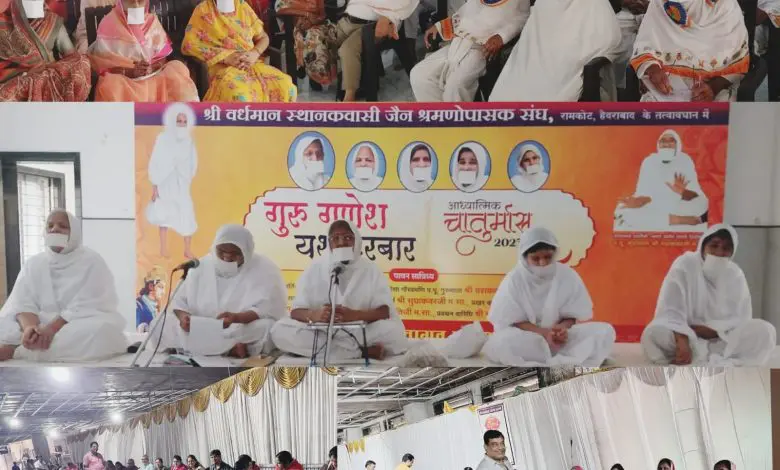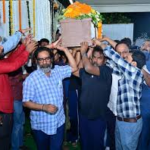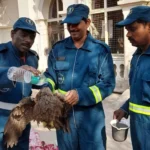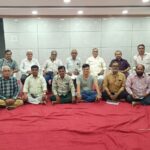Hyderabad, During the discourse assembly organized under the auspices of Shri Vardhaman Sthanakvasi Jain Shramanopasak Sangh Ramkote, Shri Sudhakavariji M.Sa., while explaining 11 out of the 21 virtues of a Shravak as per Lord Mahavir’s final teachings in the Uttaradhyayan Sutra, stated that human life is afflicted by three thorns—Maya (deceit), Nidan (attachment), and Mithya Darshan (false perception).
It was explained that Maya, meaning deceit and fraud, leads a person to hell. Maya is compared to a serpent. Practicing righteousness brings simplicity to the mind. People are categorized into three types: those hard both inside and out like a betel nut (Kalu Kasai), those hard outside but soft inside like a coconut (similar to a mother), and those soft both inside and out like a grape.
Shri Suyashaji M.Sa. Explained: Praise Virtues, Not Ego
According to a joint press release issued today, Shri Suyashaji M.Sa., while guiding the spiritual journey, explained that one should praise others in life but avoid pride in self-praise. Praise the virtuous, not the wealthy. Positive thinking leads to progress, while negative thinking leads to downfall. Appreciate those who perform good deeds.
Today, while conducting the religious assembly, the president of the Sangh mentioned that continuous prayers and penance are ongoing in the building. Yesterday, the benefit of chanting the Mahamantra Navkar was taken by Shakuntala Ramesh Barmecha. Today’s benefit was taken by the Seema Rajendra Singh family. In the Teli series, Samata Singh today undertook 2 fasts from the holy words of Guru Maiya, and Sunita Kothari accepted the Pratyakhyan of Ayambil.
The benefit of performing the Ekasan of Mother Padmavati was taken by the Amar Chand Ramabai Kotecha family. Today, the benefit of Prabhavana was taken by the Gautam Chand Anmol Kankaria family. After the discourse, a Q&A session was organized. Participants were awarded prizes.
Also Read:
On this occasion, officials of the Marudhar Kesari Seva Samiti requested Sadhvishri to grace the upcoming birth anniversary celebrations of Marudhar Kesari Shri Mishrimalji M.Sa. and Lokmanya Sant Senior Promoter Shri Rupchandji M.Sa., to be held on 3rd August.
The Sangh’s General Secretary expressed gratitude, stating that under the three-day program marking the 125th birth anniversary of the first Acharya of Shraman Sangh, Rashtrasant Acharya Samrat Shri Anand Rishiji M.Sa., Ekasan Day and Chanting Day were observed. On 27th July, Samayik Day and Gunanuvad Sabha will be organized.
Shri Vardhaman Sthanakvasi Jain Shramanopasak Sangh Ramkote
The **Shri Vardhaman Sthanakvasi Jain Shramanopasak Sangh Ramkote** is a prominent Jain religious and cultural center associated with the Sthanakvasi sect, which emphasizes asceticism and meditation. Located in Ramkote, it serves as a hub for Jain teachings, community gatherings, and spiritual practices. The site reflects the broader history of the Sthanakvasi tradition, which emerged in the 15th century as a reform movement within Jainism, advocating for simplicity and non-idol worship.
Uttaradhyayan Sutra
The *Uttaradhyayan Sutra* is a sacred Jain text that forms part of the *Agamas*, the canonical scriptures of Jainism. It consists of 36 chapters and contains teachings, dialogues, and stories attributed to Lord Mahavira and other Jain ascetics, focusing on ethics, discipline, and spiritual liberation. Composed around the 3rd century BCE to the 1st century CE, it serves as a key guide for monks and lay followers in the Jain tradition.
Mahamantra Navkar
„Mahamantra Navkar“ refers to the sacred *Namokar Mantra* (or *Navkar Mantra*), the most important mantra in Jainism. It honors the *Panch Parmeshthi* (five supreme spiritual beings): Arihants, Siddhas, Acharyas, Upadhyayas, and Sadhus. Dating back to ancient Jain traditions, this mantra is recited daily by Jains for spiritual purification and reverence to enlightened souls.
Mother Padmavati
„Mother Padmavati“ refers to Goddess Padmavati, a revered deity in Jainism, particularly in the Digambara tradition. She is considered the consort of Lord Parshvanatha, the 23rd Tirthankara, and is worshipped as a symbol of prosperity and protection. Her main temple is located in Kolhapur, Maharashtra, though she is also venerated in other Jain temples across India, with historical roots tracing back to ancient Jain traditions.
Marudhar Kesari Seva Samiti
Marudhar Kesari Seva Samiti is a social and cultural organization in India, primarily dedicated to community service, education, and preserving Rajasthani heritage. Named after the legendary Rajput warrior-ruler Rana Kumbha (revered as *Marudhar Kesari*), it promotes traditional values, charitable activities, and regional culture. While its exact founding date is unclear, it remains active in fostering social welfare and cultural pride.
Marudhar Kesari Shri Mishrimalji M.Sa.
„Marudhar Kesari Shri Mishrimalji M.Sa.“ is a revered Jain temple and cultural site in India, dedicated to the teachings and legacy of the influential Jain ascetic Shri Mishrimalji. Known for its spiritual significance and architectural beauty, the temple serves as a center for Jain worship and community gatherings. While specific historical details may vary, it is often associated with promoting Jain values of non-violence (ahimsa) and compassion.
Lokmanya Sant Senior Promoter Shri Rupchandji M.Sa.
„Lokmanya Sant Senior Promoter Shri Rupchandji M.Sa.“ appears to be a cultural or spiritual site associated with a revered Jain figure, Shri Rupchandji, who was likely a senior promoter (leader or teacher) in the Lokmanya Sant tradition. The name suggests ties to Jainism, particularly the Digambara or Shwetambara traditions, which emphasize non-violence and asceticism. Further historical details would require more specific context, but the title indicates a place of reverence dedicated to his teachings or legacy.
Rashtrasant Acharya Samrat Shri Anand Rishiji M.Sa.
„Rashtrasant Acharya Samrat Shri Anand Rishiji M.Sa.“ is a revered spiritual leader and Jain Acharya (ascetic teacher) known for his contributions to Jain philosophy, education, and social reform. He is associated with the Shwetambar Murtipujak Jain tradition and has established educational and religious institutions to promote Jain values. His title „Rashtrasant“ reflects his national recognition as a saintly figure dedicated to spiritual and societal upliftment.






